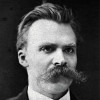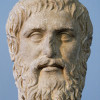“ Love is of something, and that which love desires is not that which love is or has; for no man desires that which he is or has. ”
Plato, Symposium. copy citation
| Author | Plato |
|---|---|
| Source | Symposium |
| Topic | love desire |
| Date | |
| Language | English |
| Reference | |
| Note | Translated by Benjamin Jowett |
| Weblink | http://www.gutenberg.org/files/1600/1600-h/1600-h.htm |
Context
“He begins by remarking satirically that he has not understood the terms of the original agreement, for he fancied that they meant to speak the true praises of love, but now he finds that they only say what is good of him, whether true or false. He begs to be absolved from speaking falsely, but he is willing to speak the truth, and proposes to begin by questioning Agathon. The result of his questions may be summed up as follows:—
Love is of something, and that which love desires is not that which love is or has; for no man desires that which he is or has. And love is of the beautiful, and therefore has not the beautiful. And the beautiful is the good, and therefore, in wanting and desiring the beautiful, love also wants and desires the good. Socrates professes to have asked the same questions and to have obtained the same answers from Diotima, a wise woman of Mantinea, who, like Agathon, had spoken first of love and then of his works.”
source


